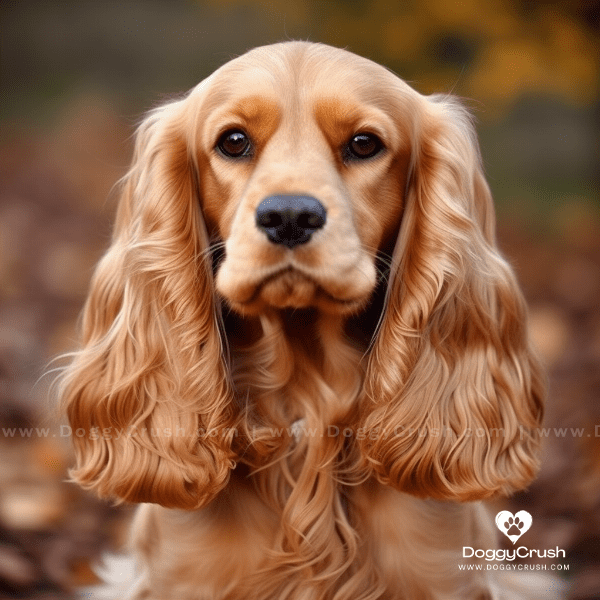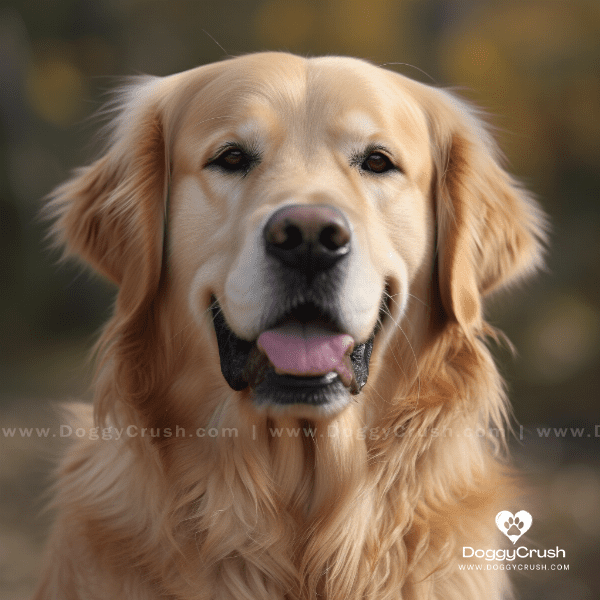Table of Contents
- History and Origin of Cocker Spaniel Dog
- Physical Characteristics and Appearance of Cocker Spaniel Dog
- Temperament and Personality of Cocker Spaniel Dog
- Caring for Your Cocker Spaniel: Diet and Exercise Needs
- Grooming Your Cocker Spaniel: Coat Care and Maintenance
- Common Health Issues in Cocker Spaniel Dog: Prevention and Treatment
- Training Your Cocker Spaniel: Tips and Techniques
- Living with a Cocker Spaniel: Compatibility with Children and Other Pets
- Finding the Perfect Cocker Spaniel: Breeders, Rescue Centers, and Adoption
- Conclusion: Is a Cocker Spaniel Dog Right for You?
History and Origin of Cocker Spaniel Dog
Cocker Spaniel dogs have a rich history that dates back to the 14th century. These dogs originated in Spain and were used for hunting small game such as birds, rabbits, and squirrels. In the early 1800s, the breed was imported to England, where they were further developed into the modern-day Cocker Spaniel we know today.
English vs. American Cocker Spaniel
Over time, the Cocker Spaniel breed diverged into two distinct types: the English Cocker Spaniel and the American Cocker Spaniel. The English Cocker Spaniel is a larger breed with a longer snout and a more slender body. They are still used today for hunting, but are also popular as companion dogs. The American Cocker Spaniel, on the other hand, is a smaller breed with a rounder head and shorter snout. They are more commonly kept as pets and are known for their affectionate and loyal personalities.
Popularity and Recognition
Cocker Spaniel dogs quickly gained popularity in the United States and were recognized by the American Kennel Club (AKC) in 1878. Since then, they have become one of the most popular breeds in America, consistently ranking in the top 30 breeds in terms of AKC registrations. In addition to their popularity in the US, Cocker Spaniels are also recognized and loved worldwide, with breed clubs and associations in many countries.
Impact on Other Breeds
The Cocker Spaniel has also had a significant impact on the development of other breeds. For example, the Cavalier King Charles Spaniel was developed from the King Charles Spaniel, which is believed to have been crossed with a Cocker Spaniel. The English Springer Spaniel, which is also used for hunting, is believed to have descended from the English Cocker Spaniel.
In conclusion, the Cocker Spaniel dog is a breed with a fascinating history that spans centuries and continents. From their humble beginnings as hunting dogs in Spain to their current status as beloved pets and companions, Cocker Spaniels have left an indelible mark on the world of dogs and will continue to be cherished for years to come.
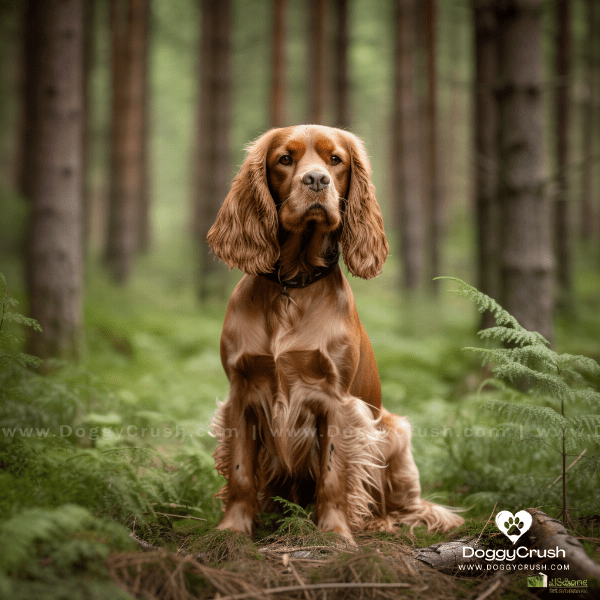
Physical Characteristics and Appearance of Cocker Spaniel Dog
The Cocker Spaniel dog is a medium-sized breed with a sturdy, compact build. They have a distinctive silky coat that comes in a variety of colors including black, liver, red, and golden. Their floppy ears and soft, soulful eyes give them an adorable and endearing appearance.
Height and Weight
Male Cocker Spaniels typically stand between 14.5 to 15.5 inches (37-39 cm) tall at the shoulder, while females are slightly smaller at 13.5 to 14.5 inches (34-37 cm) tall. They typically weigh between 20 to 30 pounds (9-14 kg), with males being slightly larger and heavier than females.
Coat and Grooming
As mentioned earlier, the Cocker Spaniel dog has a beautiful and silky coat. Their fur is typically medium-length and can be straight or slightly wavy. They require regular grooming to keep their coat looking shiny and healthy. This includes brushing at least once a week to prevent matting and tangling, as well as regular baths to keep them clean and smelling fresh.
Facial Features
One of the most distinctive features of the Cocker Spaniel dog is their adorable face. They have big, round eyes that are typically dark brown or hazel in color. Their ears are long and droopy, adding to their cute and cuddly appearance. The breed also has a characteristic snub nose, which is shorter and wider than that of many other breeds.
Overall Impression
The Cocker Spaniel dog has a cheerful and lively disposition that is reflected in their appearance. They are an attractive breed with a friendly and engaging expression that is sure to capture the hearts of those around them. Whether they are out for a walk or cuddled up at home, Cocker Spaniels are always a pleasure to look at and spend time with.
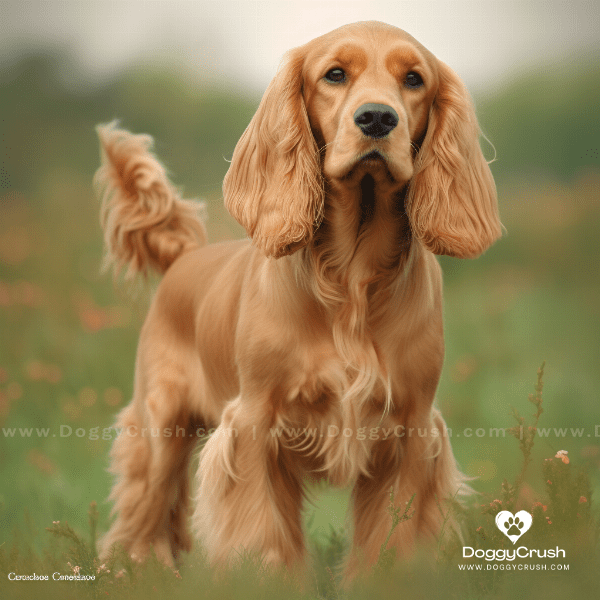
Temperament and Personality of Cocker Spaniel Dog
The Cocker Spaniel dog is known for its friendly and affectionate nature, making it a popular choice as a family pet. Here are some of the key personality traits that define this breed.
Sociable and Friendly
Cocker Spaniels are naturally sociable and enjoy being around people. They are known for their friendly and outgoing nature and are often described as “people pleasers.” This makes them great pets for families with children or for people who are looking for a companion to keep them company.
Energetic and Playful
Cocker Spaniels are also energetic and playful dogs. They love to play and have fun, whether it’s chasing a ball in the yard or going for a walk in the park. This makes them a great choice for people who are looking for a pet that can keep up with an active lifestyle.
Affectionate and Loyal
One of the most endearing qualities of the Cocker Spaniel dog is their affectionate and loyal nature. They love to cuddle and be close to their owners, and are known for being very attentive to their human family. They are also fiercely loyal and will do anything to protect their loved ones.
Intelligent and Trainable
Cocker Spaniels are intelligent dogs that are quick to learn and respond well to training. They are known for their eager-to-please attitude and are highly trainable, making them a great choice for first-time dog owners.
Sensitive and Emotional
Despite their cheerful and happy-go-lucky demeanor, Cocker Spaniels are also sensitive and emotional dogs. They can be easily upset by changes in their environment or routine, and may become anxious or stressed if left alone for long periods of time.
In conclusion, the Cocker Spaniel dog is a delightful breed with a lovable and engaging personality. They are friendly, energetic, affectionate, loyal, and intelligent dogs that make great companions for people of all ages. If you are looking for a pet that is both playful and loving, the Cocker Spaniel may be the perfect breed for you.

Caring for Your Cocker Spaniel: Diet and Exercise Needs
Proper diet and exercise are essential for the health and well-being of your Cocker Spaniel dog. Here are some tips on how to care for your pet’s diet and exercise needs.
Feeding Your Cocker Spaniel
Cocker Spaniels are generally healthy dogs that have few specific dietary requirements. However, it is important to feed them a high-quality dog food that is appropriate for their age, size, and activity level. Be sure to read the labels carefully and avoid any foods that contain fillers, artificial preservatives, or additives that may be harmful to your dog’s health. It is also important to provide your Cocker Spaniel with fresh water at all times.
Exercise Requirements
Cocker Spaniels are an active breed that require regular exercise to stay healthy and happy. Daily walks, runs, or games of fetch are great ways to keep your pet active and engaged. Cocker Spaniels also enjoy activities such as swimming and hiking, which can provide them with additional mental and physical stimulation.
Grooming and Hygiene
Cocker Spaniels have a long, silky coat that requires regular grooming to prevent matting and tangling. Brushing your pet’s coat at least once a week is recommended, and more frequent grooming may be necessary during shedding season. In addition to coat care, it is important to maintain your Cocker Spaniel’s dental hygiene by regularly brushing their teeth and providing them with dental chews or treats.
Health Concerns
Like all dogs, Cocker Spaniels are susceptible to certain health conditions such as hip dysplasia, ear infections, and skin allergies. Regular visits to the veterinarian and preventative care such as vaccinations and flea and tick control can help keep your pet healthy and happy.
In conclusion, caring for your Cocker Spaniel’s diet and exercise needs is essential for their overall health and well-being. By providing them with a nutritious diet, regular exercise, and proper grooming and hygiene, you can ensure that your pet is happy, healthy, and thriving.
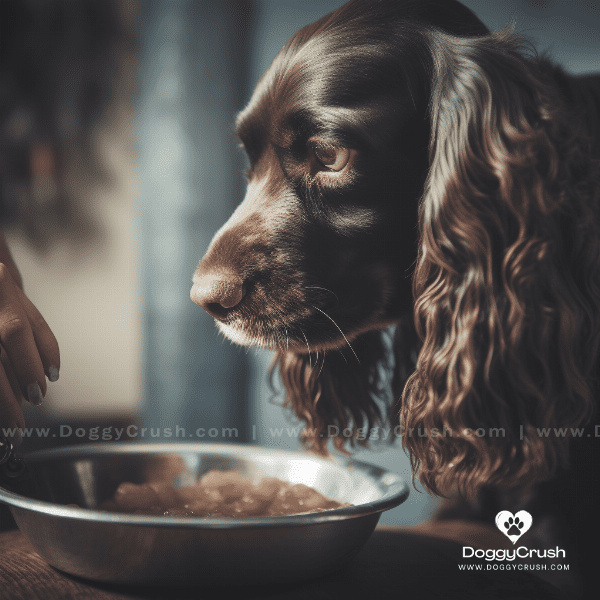
Grooming Your Cocker Spaniel: Coat Care and Maintenance
The Cocker Spaniel dog has a beautiful, silky coat that requires regular grooming to keep it looking healthy and shiny. Here are some tips on how to groom your Cocker Spaniel’s coat.
Brushing Your Cocker Spaniel’s Coat
Regular brushing is essential for preventing matting and tangling of your Cocker Spaniel’s coat. Use a slicker brush or comb to remove any tangles or knots, and then brush the coat thoroughly to distribute the natural oils and promote a healthy shine. It is recommended to brush your Cocker Spaniel’s coat at least once a week, and more frequently during shedding season.
Bathing Your Cocker Spaniel
Bathing your Cocker Spaniel regularly is important to keep their coat clean and free of dirt and debris. Use a gentle dog shampoo that is specifically formulated for their coat type, and avoid getting water in their ears to prevent infections. After bathing, dry your Cocker Spaniel thoroughly with a towel or hairdryer, being careful not to burn their skin with the heat.
Trimming Your Cocker Spaniel’s Coat
Trimming your Cocker Spaniel’s coat can help keep it looking neat and tidy. Use scissors or clippers to trim any excess fur around the ears, paws, and anus. You can also trim the fur on their belly and around their tail to prevent matting and tangling.
Other Grooming Needs
In addition to coat care, it is important to maintain your Cocker Spaniel’s nails, teeth, and ears. Trim their nails regularly to prevent them from becoming too long, and brush their teeth at least once a week to prevent dental problems. Check their ears regularly for signs of infection or inflammation, and clean them with a gentle ear cleaner as needed.
In conclusion, proper grooming is essential for keeping your Cocker Spaniel’s coat looking healthy and shiny. By regularly brushing, bathing, and trimming their coat, and maintaining their nails, teeth, and ears, you can help ensure that your pet is happy, healthy, and looking their best.
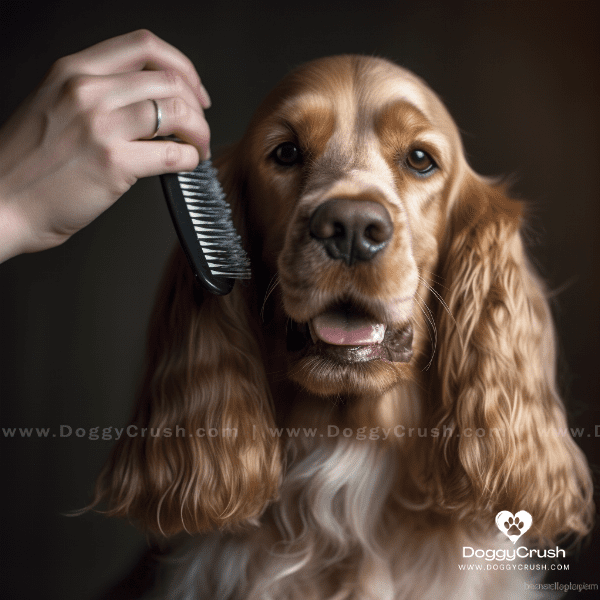
Common Health Issues in Cocker Spaniel Dog: Prevention and Treatment
Cocker Spaniels are generally a healthy breed, but like all dogs, they are prone to certain health issues. Here are some of the most common health concerns in Cocker Spaniels and how to prevent and treat them.
Ear Infections
Cocker Spaniels are known for their long, floppy ears, which can trap moisture and debris and lead to ear infections. To prevent ear infections, it is important to keep your Cocker Spaniel’s ears clean and dry. Use a gentle ear cleaner to remove any wax or debris, and keep their ears trimmed to promote air flow. If your pet does develop an ear infection, your veterinarian may prescribe antibiotics or other medications to treat the infection.
Hip Dysplasia
Hip dysplasia is a condition that affects the hip joint and can cause pain, lameness, and arthritis. To prevent hip dysplasia, it is important to keep your Cocker Spaniel at a healthy weight and provide them with regular exercise to keep their muscles strong. If your pet does develop hip dysplasia, your veterinarian may recommend a combination of medication, physical therapy, and surgery to manage the condition.
Skin Allergies
Cocker Spaniels are prone to skin allergies, which can cause itching, rashes, and hair loss. To prevent skin allergies, it is important to feed your pet a high-quality diet that is free of common allergens such as wheat, corn, and soy. Regular grooming and maintenance of your pet’s coat can also help prevent skin allergies. If your pet does develop a skin allergy, your veterinarian may recommend medication or a special diet to manage the condition.
Eye Problems
Cocker Spaniels are prone to several eye problems, including cataracts, glaucoma, and progressive retinal atrophy. To prevent eye problems, it is important to have your pet’s eyes checked regularly by a veterinarian. If your pet does develop an eye problem, your veterinarian may recommend medication or surgery to manage the condition.
In conclusion, while Cocker Spaniels are generally a healthy breed, they are prone to certain health issues. By taking steps to prevent these issues and seeking prompt veterinary care if your pet does develop a health concern, you can help ensure that your Cocker Spaniel remains happy and healthy for years to come.

Training Your Cocker Spaniel: Tips and Techniques
Training your Cocker Spaniel is essential for their well-being and to ensure they are well-behaved around people and other pets. Here are some tips and techniques for training your Cocker Spaniel.
Start Training Early
It is important to start training your Cocker Spaniel at a young age. Puppies are more receptive to training and can learn new commands and behaviors quickly. Consistency and patience are key to successful training, so be sure to set aside regular training sessions and stick to a routine.
Use Positive Reinforcement
Positive reinforcement is one of the most effective training techniques for dogs, including Cocker Spaniels. This involves rewarding good behavior with treats, praise, or affection. It is important to avoid punishment or negative reinforcement, which can be counterproductive and lead to anxiety or aggression.
Teach Basic Commands
Teaching your Cocker Spaniel basic commands such as sit, stay, come, and heel is essential for their safety and well-being. These commands can also help prevent unwanted behaviors such as jumping, barking, or chewing. Be sure to use clear and consistent verbal cues and hand signals to reinforce the commands.
Socialize Your Cocker Spaniel
Socialization is important for helping your Cocker Spaniel develop positive behaviors around people and other pets. Introduce your pet to new people and pets in a controlled and positive environment, such as a dog park or obedience class. Be sure to reward good behavior with treats and praise.
Seek Professional Help if Needed
If you are having difficulty training your Cocker Spaniel or if your pet is displaying aggressive or destructive behaviors, seek professional help from a certified dog trainer or behaviorist. They can provide additional tips and techniques for training your pet and help you address any underlying behavioral issues.
In conclusion, training your Cocker Spaniel is essential for their safety and well-being. By starting training early, using positive reinforcement, teaching basic commands, socializing your pet, and seeking professional help if needed, you can help ensure that your Cocker Spaniel is well-behaved and happy around people and other pets.
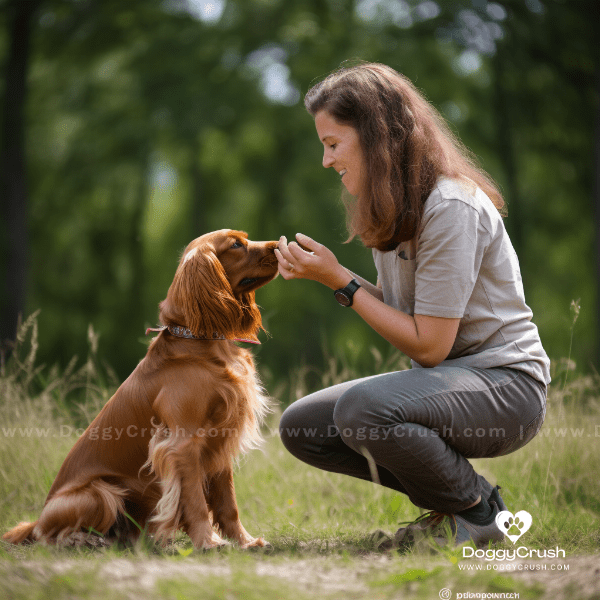
Living with a Cocker Spaniel: Compatibility with Children and Other Pets
Cocker Spaniels are generally friendly and sociable dogs that can make great companions for families with children and other pets. Here are some tips on how to ensure a harmonious living environment with your Cocker Spaniel.
Children
Cocker Spaniels are generally good with children, but it is important to supervise interactions between your pet and young children. Teach your children how to properly handle and interact with your pet, and never leave them alone together. It is also important to teach your pet basic commands and manners to ensure that they do not accidentally harm a child during play.
Other Pets
Cocker Spaniels can also get along well with other pets, including cats and other dogs. However, it is important to introduce your pet to other animals in a controlled and positive environment, and to supervise their interactions. Be sure to provide separate food and water bowls, toys, and sleeping areas to prevent any territorial disputes.
Training and Socialization
Training and socialization are important for ensuring that your Cocker Spaniel is well-behaved around children and other pets. Teach your pet basic commands and manners, and socialize them to different people and animals from a young age. Positive reinforcement training techniques can be effective in teaching your pet good behavior around children and other pets.
Exercise and Play
Regular exercise and playtime can also help ensure that your Cocker Spaniel is well-behaved around children and other pets. Take your pet for regular walks, runs, or games of fetch to help burn off excess energy and prevent destructive behaviors. Providing toys and playtime can also help prevent boredom and promote good behavior.
In conclusion, Cocker Spaniels can make great companions for families with children and other pets. By supervising interactions, providing training and socialization, and ensuring regular exercise and playtime, you can help ensure that your Cocker Spaniel is a happy and well-behaved member of your household.

Finding the Perfect Cocker Spaniel: Breeders, Rescue Centers, and Adoption
If you are interested in adding a Cocker Spaniel to your family, there are several options for finding the perfect pet. Here are some tips on how to find a Cocker Spaniel through breeders, rescue centers, and adoption.
Breeders
When looking for a Cocker Spaniel breeder, it is important to do your research and find a reputable breeder that breeds healthy, well-tempered dogs. Look for breeders that are members of national or local breed clubs and adhere to ethical breeding practices. You can also ask for references from previous customers and visit the breeder’s facility to meet the dogs and see how they are cared for.
Rescue Centers
Rescue centers are a great option for finding a Cocker Spaniel that needs a new home. These centers take in dogs that have been abandoned, surrendered, or rescued from abusive situations. Many rescue centers provide medical care, behavioral training, and socialization for the dogs in their care, and can help match you with a Cocker Spaniel that fits your lifestyle and personality.
Adoption
Adoption is another option for finding a Cocker Spaniel that needs a new home. Many animal shelters and rescue groups offer adoption services and can help match you with a Cocker Spaniel that fits your lifestyle and personality. Adoption fees may vary, but they typically include spaying or neutering, vaccinations, and other medical care.
Questions to Ask
Whether you choose to go through a breeder, rescue center, or adoption, it is important to ask questions about the dog’s health, temperament, and history. Some important questions to ask include:
- What is the dog’s history and background?
- Has the dog had any health issues or medical treatments?
- What is the dog’s temperament and energy level?
- Has the dog been socialized with other pets and children?
- What kind of training and exercise has the dog had?
In conclusion, finding the perfect Cocker Spaniel for your family can be a rewarding and fulfilling experience. By doing your research and considering options such as breeders, rescue centers, and adoption, you can find a loving and loyal companion that will bring joy to your life for years to come.

Conclusion: Is a Cocker Spaniel Dog Right for You?
Cocker Spaniels are a popular breed known for their friendly personalities, beautiful coats, and loyal companionship. If you are considering adding a Cocker Spaniel to your family, there are several factors to consider to determine if this breed is right for you.
Personality and Temperament
Cocker Spaniels are generally friendly, sociable dogs that enjoy spending time with their owners. They are known for their loyalty and affection, and can make great companions for families with children and other pets. However, they may require regular training and socialization to prevent unwanted behaviors such as barking, jumping, or digging.
Grooming Needs
Cocker Spaniels have long, silky coats that require regular grooming to prevent matting and tangling. They may also be prone to ear infections and skin allergies, which require regular maintenance and care. If you are not able to commit to regular grooming and maintenance, a Cocker Spaniel may not be the right breed for you.
Exercise and Training
Cocker Spaniels require regular exercise and playtime to maintain their physical and mental health. They may also require training and socialization to prevent unwanted behaviors and ensure good behavior around people and other pets. If you are not able to commit to regular exercise and training, a Cocker Spaniel may not be the right breed for you.
Finding the Perfect Pet
Whether you choose to go through a breeder, rescue center, or adoption, it is important to do your research and find a reputable source for your Cocker Spaniel. Ask questions about the dog’s health, temperament, and history, and consider your lifestyle and personality when choosing a pet.
In conclusion, Cocker Spaniels can make wonderful pets for the right owner. By considering factors such as personality and temperament, grooming needs, exercise and training, and finding the perfect pet, you can determine if a Cocker Spaniel is the right breed for you. With proper care and attention, a Cocker Spaniel can bring joy and companionship to your life for many years to come.
